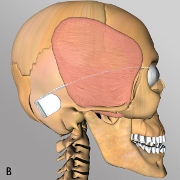Paralympic swimmer, Tim Reddish, has been able to see again after taking part in a trial of a revolutionary new retinal chip that could change the lives of blind people around the world.
Reddish has been totally blind for the past 17 years after being diagnosed with the degenerative eye condition retinitis pigmentosa, which affects around 20,000 people in the UK.
Chairman of the British Paralympic Association, he is one of nine totally blind patients currently taking part in a trial being run by the Oxford University Eye Hospital and King’s College Hospital in London.
The study is exploring the impact of a chip manufactured by German company, Retina Implant, which is packed with 1,500 light-sensitive panels and produces a pixelated image mimicking the function of the photoreceptor rod and cone cells in the eye that are destroyed as a result of retinitis pigmentosa. This image is then boosted by an amplifier buried inside a patient’s head just behind their ear, which is in turn linked to the chip via a cable under the skin. A battery pack carried in the patient’s pocket and connected magnetically to the amplifier controls power to the chip in low light to aid vision. The signal is then transmitted via the optic nerve to the brain for processing. As a result patients have been able to make out shapes and shades, including the time on a clock face.
Surgery to implant the artificial retina takes eight hours and costs around £100,000 per patient. The trial is being funded by Department of Health’s National Institute for Health Research and involves the chip being planted into just one eye of each patient.
Commenting on his experience during the trial, Reddish said: “It was as if a match had been lit in a dark room – it was unbelievable.
“In the lab tests, when there are objects on a table and the lighting is bright, I can tell you how many objects there are, and most of the time I can read the clock.”
And he says he is looking forward to being able to see the medals he has won for the first time, including the Paralympic silver medals he won in Barcelona in 1994, Atlanta in 1996 and in Sydney in 2000.

Early trials show a vast improvement in sight
“To be able to see even the vaguest of blurry outlines of the medals I have won is a terrific achievement and means a lot to me,” he added.
Robert MacLaren is one of the consultant retinal surgeons involved in the trial. He said: “This technology has proven that it is possible to restore some sight to a person who before was completely blind. It is a huge step forward, but there is still much more work to be done.”
Retina Implant is hoping the trial will support earlier indications that the chip can help to significantly improve sight among patients with retinitis pigmentosa.
A spokesman said: “Based on the technical characteristics of the implant, theoretically 10% vision should be attainable. As a result, it should become possible again for a patient to orient himself or herself in a room without another person’s help and to move freely about. Conceivably, it should also become possible to recognise objects and faces. Whether or not patients who have received an active chip implant from Retina Implant AG will be able also to read can only be known when the results of the clinical study trials become available.




